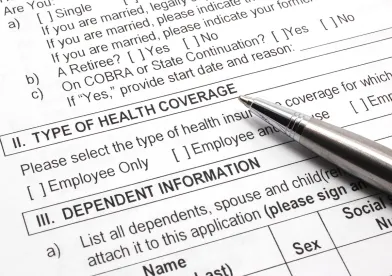With the COVID-19 Public Health Emergency (PHE) set to end on May 11, 2023, the Department of Labor, Department of the Treasury, and Department of Health and Human Services (the “departments”) have published FAQs explaining how the end of the PHE will affect group health plans. In a previous article, we discussed how prior extensions relating to COBRA, HIPAA special enrollment, and claims and appeals would be affected. This article provides an overview of other issues raised under the FAQs, including how the end of the PHE will affect mandated coverage relating to COVID-19. Employers should review their plan documents and plan operations with respect to these issues.
-
Coverage for COVID-19 Testing: Under the Families First Coronavirus Response Act, group health plans are required to cover COVID-19 testing (and related items and services) during the PHE without participant cost-sharing. If a plan chooses to provide this coverage after the PHE ends, it will be allowed to impose cost-sharing requirements, prior authorization, and other medical management requirements. The FAQs clarify that, if a test is furnished during the PHE, the plan must cover the test (even if the laboratory analysis occurs after PHE ends). Despite this change, the departments encourage plans to continue providing COVID-19 testing without imposing cost-sharing or medical management requirements.
-
COVID-19 Testing and HSAs: The pandemic-era rule allowing a high-deductible health plan to cover COVID-19 testing and treatment before satisfying the minimum deductible without affecting the participant’s eligibility to contribute to an HSA will remain in place until further guidance is issued.
-
Medicaid and CHIP: In connection with the PHE, state agencies generally have not terminated coverage for any Medicaid or CHIP beneficiary who was covered at any time on or after March 18, 2020. This “continuous enrollment” method of coverage is ending in some states, and many are resuming normal eligibility determinations for Medicaid and CHIP coverage, which may result in employees or dependents losing coverage. Plan sponsors should ensure that such employees are provided the opportunity to make or change their elections due to their HIPAA special enrollment right. The departments also encourage plan sponsors to amend their plans so that individuals have extra time to exercise these rights.
-
Summaries of Benefits and Coverages: If a plan discontinues coverage of COVID-19 items and services mid-plan year and the discontinuation will affect the plan’s most recently provided summary of benefits and coverage, the plan generally must provide notice to participants 60 days in advance of the change. However, the departments stated that the notice requirement will be deemed satisfied if (1) the plan previously notified participants that the special COVID-19 coverage rules would apply only during the PHE or (2) the plan provides advance notice “within a reasonable timeframe” before the change.
-
COVID-19 Vaccines: Non-grandfathered group health plans must continue to cover qualifying coronavirus preventative services, including COVID-19 vaccines, without participant cost sharing. This requirement is limited to COVID-19 vaccines administered by in-network providers.




 />i
/>i
